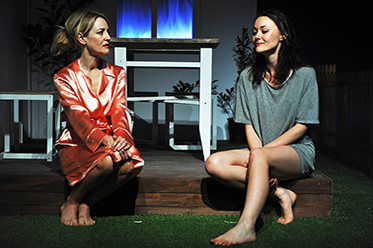Detroit by Lisa D’Amour was a finalist in the 2011 Pulitzer Prize for Drama and 2013 winner of the Obie Award for Best New American Play. It is billed as “a darkly comic and unsettling investigation of middle-class aspirations, suburban isolation and the divide between rich and poor”.
Given all this, I was quite looking forward to the Red Stitch Actors Theatre’s Victorian Premiere of the work. While the production looks good, I couldn’t say that it delivers on its claims. Perhaps inadvertently however, it may give us a surprising insight into the American psyche, and show that national identities haven’t been completely vaporised by globalism.
Detroit premiered in 2010 in Chicago, not so long after the Global Financial Crisis, Subprime mortgages and related social upheaval made headlines. Detroit was suffering from the decline of its automotive industry. It’s also a place notorious for the difference between its haves and have-nots.
Detroit opens in the backyard of para-legal Mary (Sarah Sutherland) and recently retrenched bank loan officer Ben (Paul Ashcroft), a seemingly middle-class, comfortable-enough couple. Mary has invited the new neighbours – young couple Sharon (Ngaire Dawn Fair) and Kenny (Brett Cousins) who met in rehab – over for a barbecue so they can get to know each other.
This type of scene repeats with variations over the course of the play as we get to know about the characters, their differences, and similarities. The play seems unworthy of the quote pulled from the New York Times: “… Ms D’Amour’s superb play … both disturbing and bracingly funny…”. Under the direction of Tanya Dickson some scenes laboured to make contrasts between the two couples and their opportunities apparent, making the performance feel lengthy.
This isn’t the only distraction; another relates to representations of the characters at times. However, there are some bright spots. Sutherland lets us feel Mary’s exasperation with her long days whilst homebody Ben coasts along. Her fantasy of leaving suburbia behind for a simpler life in the woods with “just one pot and one pan” seems credible.
The openness Fair gives Sharon similarly makes it easy to accept that she would want to go along with Mary, and the scenes between the two women are the most convincing. Much less so are those with Ben and Kenny; I couldn’t understand why the men would spend time in each other’s company. By the end I also didn’t see why Mary and Ben would stay together.
Sharon and Kenny look the part as a couple comfortable with each other and accustomed to partying together (in some part due to the work of choreographer Helen Duncan) but we aren’t given too much else of substance about their life and relationship. Thinking on this, I recall characters such as the Hugh Laurie’s diagnostician hooked on painkillers in House, people who have a purpose whilst living with an addiction, not being defined by it.
The limitations imposed on Kenny and Sharon reach maturity as we approach the finale. Here they show themselves to be not just addicts, but the sort of out-of-control types that could trash the area’s property values. This choice shows a willingness to trade in stereotypes, much like an American sitcom.
Also in that vein, Detroit seems to think its audience needs to have everything spelled out for them. A little knowledge of recent history means that we could form our own suspicions of how Kenny and Sharon have ended up in such a nice neighbourhood. We could work out that Mary’s vigorous consumption of wine isn’t so different from Sharon’s compulsion for pills or powder; did the older woman really need to vomit on Sharon’s porch?
Through the epilogue where local Frank (Chris Wallace) tells us how things used to be different in the old days, we complete the experience with some unnecessary sentimental padding.
By show’s end I felt that Detroit took a fairly lazy approach to considering the world. If anything, it shows us that the main differences between classes stem from the resources or supports you have around you. I suspect that an Australian who hasn’t always been middle-class and somewhat-comfortable will find Detroit a flabby way of making that fairly obvious point.
Director: Tanya Dickson Featuring: Paul Ashcroft, Brett Cousins, Ngaire Dawn Fair, Sarah Sutherland, Chris Wallace Assistant Director: Sam Russo Set & Lighting Designer: Matt Adey (House of Vnholy) Sound Designer: Russell Goldsmith Costume Designer: Jack Grifford Choreographer: Helen Duncan Vocal Coach: Les Cartwright Stage Manager: Elizabeth Downes
Detroit
Red Stitch Theatre, Rear 2 Chapel Street, St. Kilda
Season continues to 26 September 2015
Bookings: (03) 9533 8083 or online at: www.redstitch.net
For more information, visit: www.redstitch.net for details.
Image: Sarah Sutherland & Ngaire Dawn Fair in Red Stitch’s Detroit – photo by Jodie Hutchinson
Review: Jason Whyte

